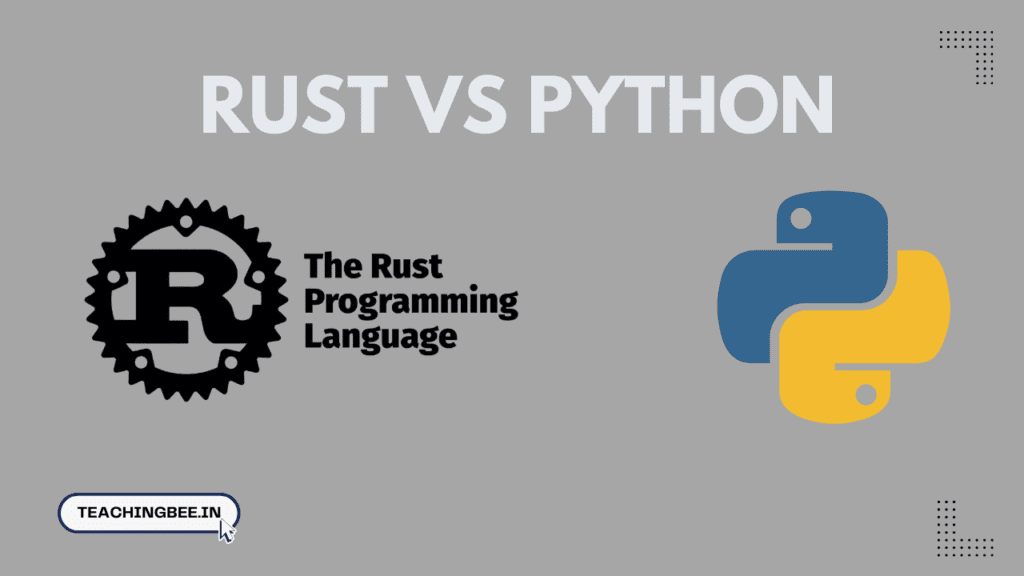Table of Contents
ToggleIn the world of programming languages, Rust and Python emerge as two formidable contenders, each boasting distinct features and strengths. Rust, renowned for its performance and safety, appeals to developers seeking efficient systems programming solutions.Python, celebrated for its simplicity and versatility, remains a favorite among developers for a myriad of applications.
In this comprehensive comparison, we delve into the key features, pros and cons, and a head-to-head analysis of Rust and Python to help developers make informed choices and try to answer the question Is Rust Better Than Python?
Key Features of Rust Programming Language


The key features of Rust Programming Language are:
Performance: Rust is renowned for its high performance and low-level control, comparable to languages like C and C++. Its emphasis on zero-cost abstractions and memory safety without a garbage collector enables developers to write highly optimized code.
Memory Safety: Rust’s ownership system and strict compiler checks ensure memory safety and prevent common memory-related bugs such as null pointer dereferencing and memory leaks. This approach makes Rust well-suited for systems programming, where manual memory management is essential for efficiency.
Concurrency: Rust’s ownership model facilitates writing safe concurrent code by ensuring thread safety and preventing data races at compile time. Developers can leverage Rust’s concurrency features to build highly performant and reliable concurrent applications.
Ecosystem: Despite being relatively young, Rust has a growing ecosystem of libraries and tools, supported by an active and inclusive community. Developers can find libraries for various use cases, from web development to systems programming, and contribute to the vibrant Rust ecosystem.
WebAssembly (Wasm) Support: Rust is well-suited for compiling to WebAssembly, enabling developers to build high-performance web applications with near-native performance directly in the browser.
Advantages of Rust Programming Language
Rust presents several notable advantages:
- Performance: Rust offers high performance and low-level control akin to C and C++.
- Memory Safety: Its ownership system and strict compiler checks prevent common memory-related bugs.
- Concurrency: Rust’s ownership model ensures thread safety and facilitates writing safe concurrent code.
- Safety Guarantees: Rust’s compiler enforces safety guarantees at compile time, reducing the likelihood of runtime errors.
- Ecosystem: Rust has a growing ecosystem of libraries and tools, supported by an active and inclusive community.
- WebAssembly (Wasm) Support: Rust is well-suited for compiling to WebAssembly, enabling high-performance web applications.
Disadvantage of Rust Programming Language
Cons of Rust Programming Language
- Learning Curve: Rust has a steep learning curve, especially for developers new to systems programming and memory management.
- Verbose Syntax: Rust’s syntax can be verbose and strict, requiring developers to adhere to its ownership and borrowing rules.
- Limited Tooling: While improving, Rust’s tooling and IDE support may not be as mature as those of more established languages.
- Compilation Time: Rust’s strict compiler checks can result in longer compilation times, especially for large projects.
- Smaller Ecosystem: Rust’s ecosystem is still growing and may not offer the same breadth of libraries and frameworks as more established languages like Python or JavaScript.
Key Features of Python


The key features of Python are:
Ease of Use: Python’s simple and readable syntax makes it easy to learn and write code quickly, contributing to high developer productivity. Its minimalist design philosophy prioritizes simplicity and readability, making Python an excellent choice for beginners and experienced developers alike.
Versatility: Python is renowned for its versatility, offering support for a wide range of applications, including web development, data analysis, scripting, and automation. Its extensive standard library and rich ecosystem of third-party packages empower developers to tackle diverse challenges with ease.
Extensive Ecosystem: Python boasts a vast ecosystem of libraries and frameworks covering various domains, from web development and data analysis to machine learning and artificial intelligence. Its large and active community provides extensive documentation, tutorials, and support resources for developers.
Interpreted Language: Python’s interpreted nature allows for rapid prototyping and iterative development, enhancing developer productivity. Developers can write code and see results immediately without the need for compilation, facilitating faster development cycles.
Platform Independence: Python’s code is platform-independent, allowing developers to write code once and run it on different platforms without modification. This feature makes Python an excellent choice for cross-platform development and deployment.
Advantages Of Python
Python offers several key advantages:
- Ease of Use: Python’s simple and readable syntax makes it easy to learn and write code quickly.
- Versatility: Python is suitable for a wide range of applications, including web development, data analysis, scripting, and automation.
- Extensive Ecosystem: Python boasts a vast ecosystem of libraries and frameworks for various domains, supported by a large and active community.
- Interpreted Language: Python’s interpreted nature allows for rapid prototyping and iterative development, enhancing developer productivity.
- Platform Independence: Python’s code is platform-independent, allowing developers to write code once and run it on different platforms without modification.
- Community Support: Python has a thriving community that provides extensive documentation, tutorials, and support resources for developers.
Disadvantages Of Python
However, Python also has its drawbacks:
- Performance: Python is slower compared to compiled languages like Rust, particularly for CPU-intensive tasks.
- Global Interpreter Lock (GIL): Python’s GIL restricts true parallelism, limiting its ability to fully utilize multi-core processors.
- Dynamic Typing: Python’s dynamic typing can lead to runtime errors and make code harder to refactor and maintain.
- Dependency Management: Python’s dependency management can be challenging, especially for projects with complex dependencies and version requirements.
- Security: Python’s dynamic nature and extensive ecosystem may introduce security vulnerabilities if not managed carefully.
- Concurrency Limitations: Python’s GIL can hinder performance in concurrent applications, although libraries like asyncio mitigate some of these limitations.
Rust Vs Python : Head-to-Head Comparison
Let’s compare Rust with Python on various parameters.
Performance: Rust excels in performance-critical applications, thanks to its emphasis on performance and low-level control. In contrast, Python is inherently slower compared to compiled languages like Rust, particularly for CPU-intensive tasks.
Memory Safety: Rust’s ownership system and strict compiler checks ensure memory safety and prevent common memory-related bugs. Python’s dynamic typing may lead to memory bugs if not managed carefully.
Concurrency: Rust offers strong support for safe concurrency, facilitating writing concurrent code with fewer bugs. Python’s Global Interpreter Lock (GIL) limits true parallelism, hindering its ability to fully utilize multi-core processors.
Learning Curve: Rust has a steeper learning curve compared to Python, especially for developers new to systems programming and memory management. Python’s simplicity and readability make it beginner-friendly and easy to learn.
Ecosystem: Python boasts a vast and mature ecosystem of libraries and frameworks, covering various domains and supported by a large and active community. Rust’s ecosystem is growing but may not offer the same breadth of libraries and frameworks as Python.
Developer Productivity: Python’s simplicity and versatility contribute to high developer productivity, allowing developers to write code quickly and efficiently. Rust’s strict compiler checks and verbose syntax may slow down development initially but lead to fewer runtime errors and better code quality in the long run.
Use Cases: Rust is well-suited for systems programming, embedded development, and performance-critical applications where safety and reliability are paramount. Python shines in web development, data analysis, scripting, and automation tasks, thanks to its simplicity, versatility, and extensive ecosystem.
Community Support: Both Rust and Python have active and supportive communities that provide extensive documentation, tutorials, and support resources for developers. Python’s larger community may offer more resources and support compared to Rust’s growing community.
| Aspect | Rust | Python |
|---|---|---|
| Performance | High performance and low-level control | Slower compared to compiled languages |
| Memory Safety | Strong emphasis on memory safety | Dynamic typing may lead to memory bugs |
| Concurrency | Strong support for safe concurrency | Limited by the Global Interpreter Lock |
| Learning Curve | Steep learning curve | Easy to learn and beginner-friendly |
| Ecosystem | Growing ecosystem with a focus on safety | Vast ecosystem with extensive libraries |
| Developer Productivity | Strict compiler checks may slow development | Rapid prototyping and iterative development |
| Use Cases | Systems programming, performance-critical applications | Web development, data analysis, scripting |
| Community Support | Active and inclusive community | Large and supportive community |
Is Rust Better Than Python?
Determining whether Rust is better than Python depends on the specific requirements of the project and the developer’s priorities.
Rust excels in performance-critical applications and systems programming due to its emphasis on performance, safety, and concurrency.
On the other hand, Python’s simplicity, versatility, and extensive ecosystem make it a top choice for rapid development, data analysis, and scripting tasks. Ultimately, the choice between Rust and Python should be based on careful consideration of factors such as performance, productivity, and ecosystem support
Similar Posts
FAQ
Which one is better Rust or Python?
The determination of whether Rust or Python is better depends on the context and requirements of the project. Rust shines in performance-critical applications and systems programming, prioritizing performance and safety. Python, with its simplicity, versatility, and extensive ecosystem, excels in rapid development, data analysis, and scripting tasks.
Will Rust replace Python?
It’s unlikely that Rust will completely replace Python. While Rust excels in performance-critical applications and systems programming, Python’s simplicity, versatility, and extensive ecosystem make it well-suited for a wide range of tasks.
Rather than being replaced, Rust and Python are likely to coexist, each serving different use cases and catering to different developer preferences and project requirements.



